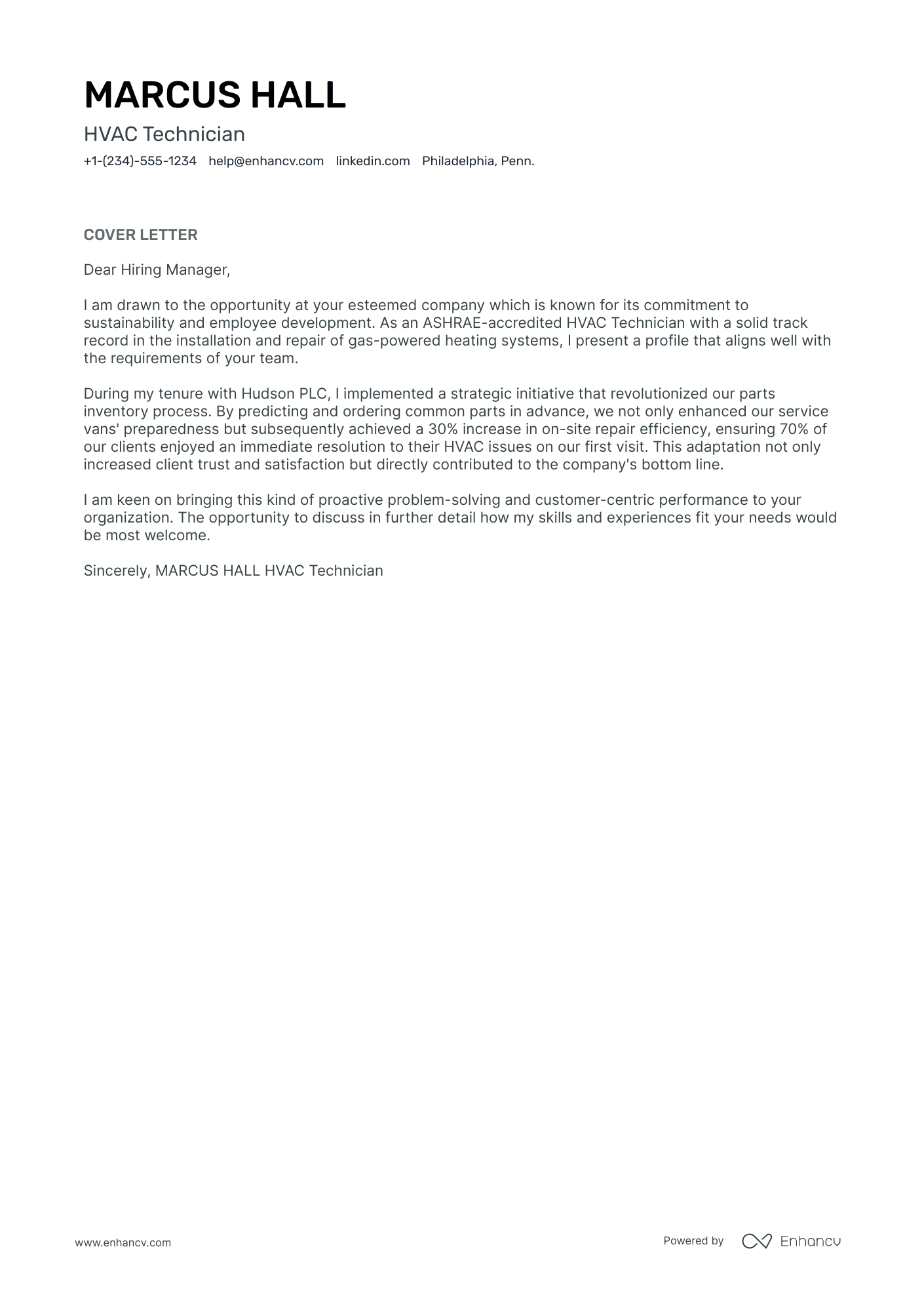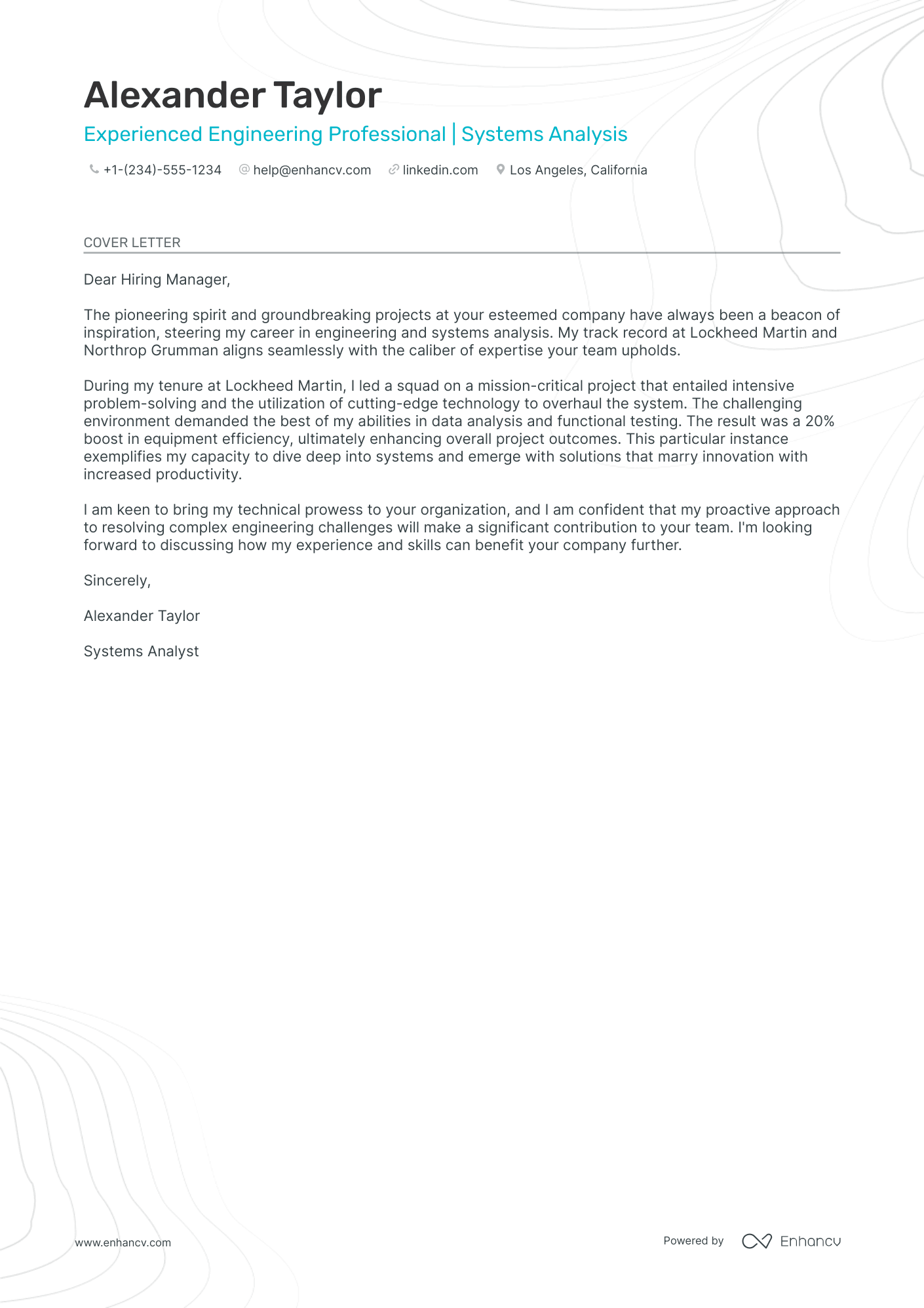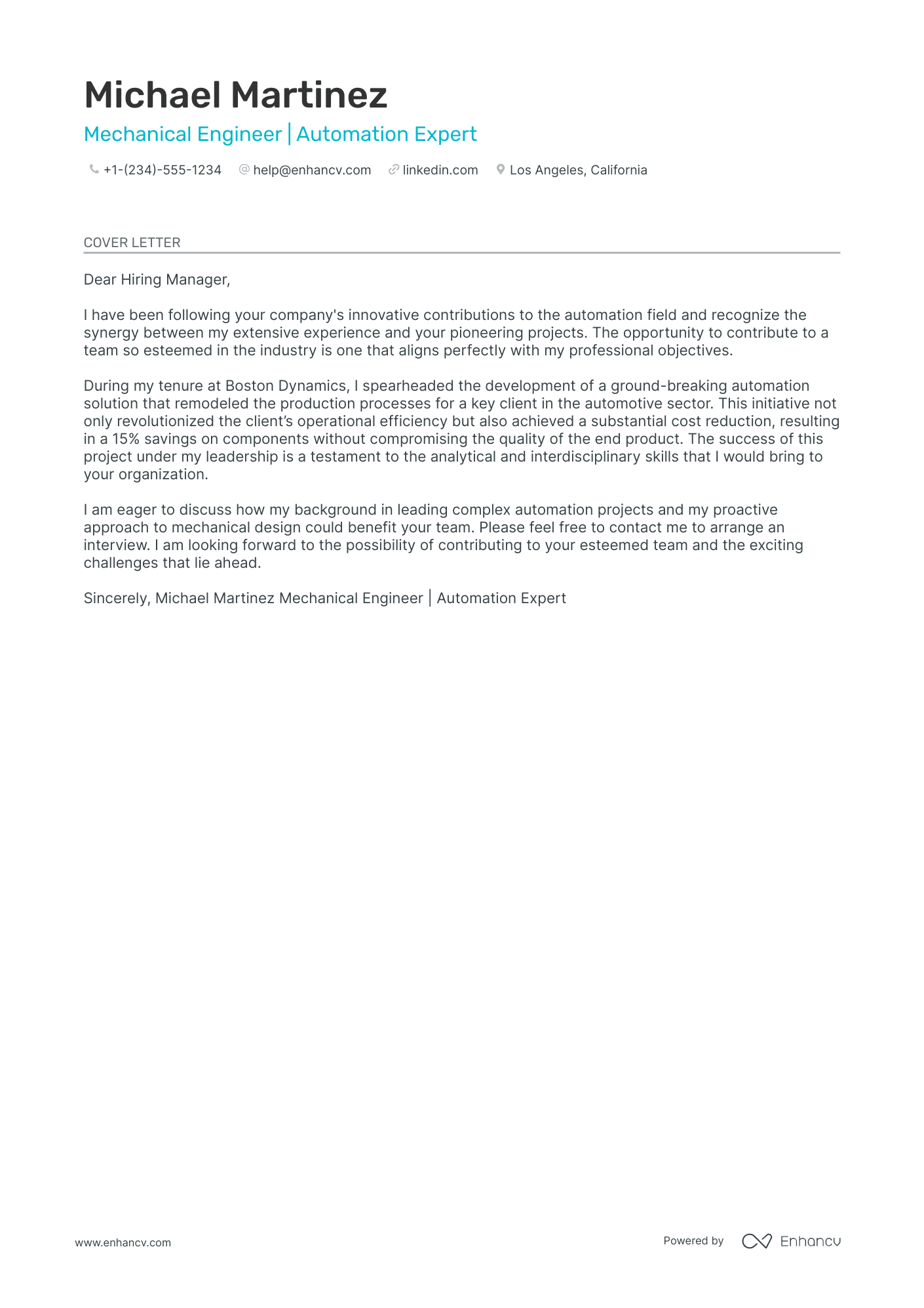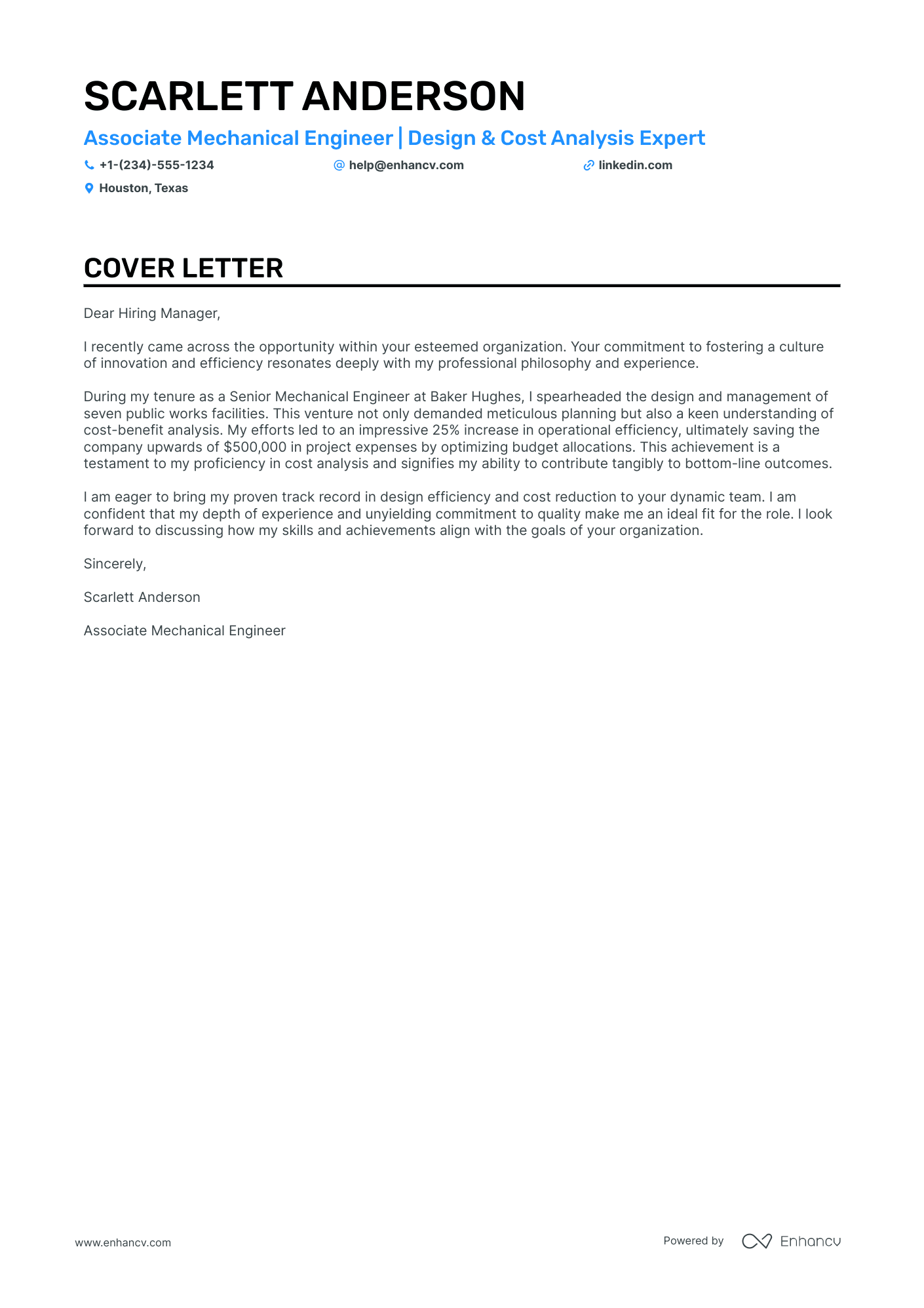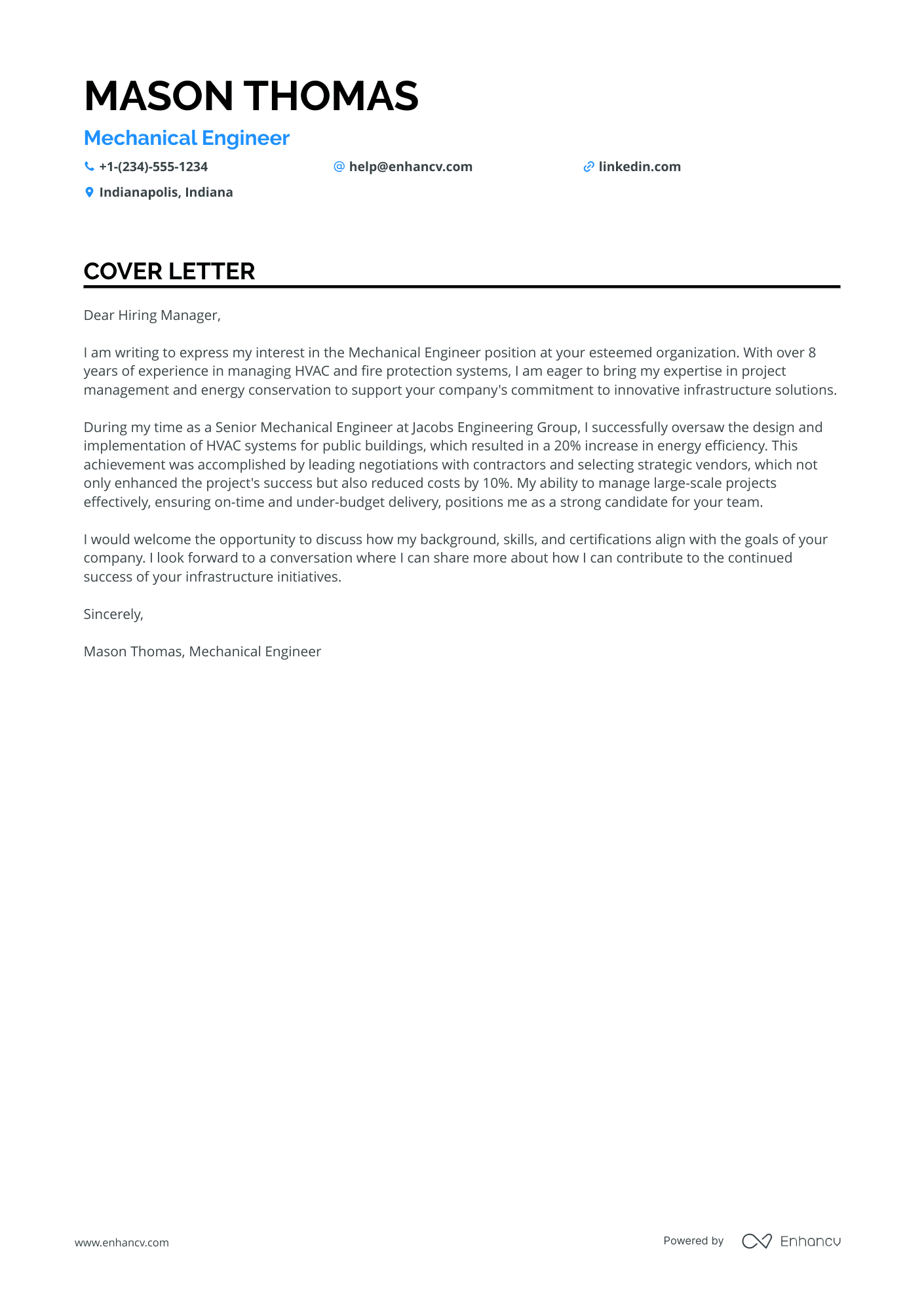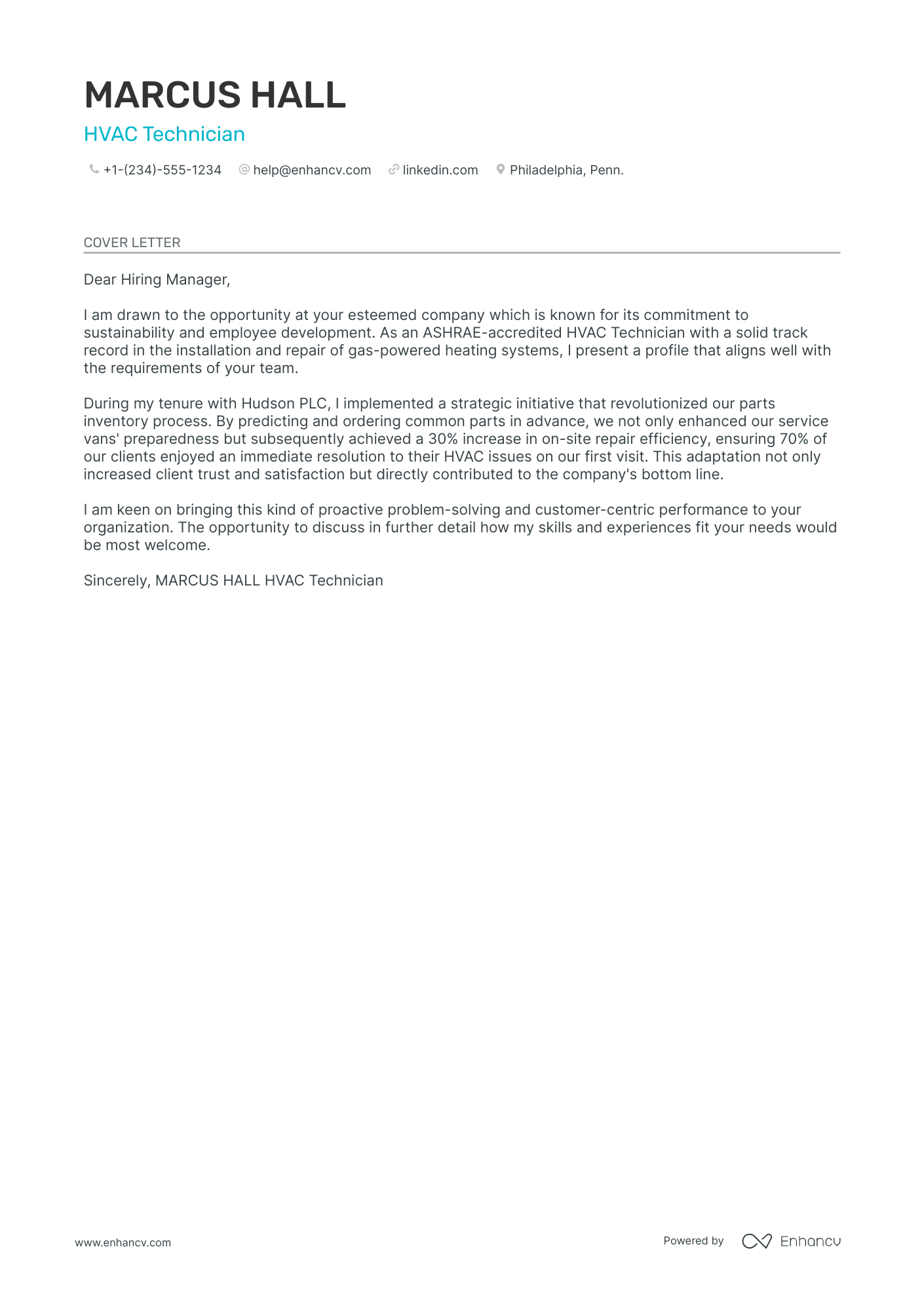Crafting a mechanical engineer cover letter can be a daunting hurdle when you're ready to leap into the job market. You've likely realized that your application won't stand out without one. A winning cover letter tells the tale of your crowning professional triumph, not just a repeat of your resume. It must be formal yet fresh, steering clear of worn-out phrases, and fit neatly on a single page. Let's tackle how to encapsulate your expertise into that crucial first impression.
- Introduce your profile to catch recruiters' attention;
- Use professional templates and examples to make sure your mechanical engineer cover letter follows the best industry standards;
- Settle on your most story-worthy achievement to shine a light on what makes your application unique;
- Write a mechanical engineer cover letter, even when you lack professional experience.
Ready to start with the basics: upload your resume to Enhancv's AI, below, to see the mechanical engineer cover letter it would write for you.
If the mechanical engineer isn't exactly the one you're looking for we have a plethora of cover letter examples for jobs like this one:
Drop your resume here or choose a file.
PDF & DOCX only. Max 2MB file size.
Mechanical engineer cover letter example
Carla Jensen
Brisbane, Australia
+1-(234)-555-1234
help@enhancv.com
- Emphasizing relevant achievements, such as spearheading projects that led to revenue increases, which showcases the candidate's capability to deliver tangible results.
- Demonstrating knowledge and experience in specialized tools and processes, like 3D CAD and production workflows, which are key to the role in question.
- Connecting personal values and professional expertise with the company's mission, such as a passion for sustainable design and environmental considerations.
Designing your mechanical engineer cover letter: what is the best format
Let's start with the basics, your mechanical engineer cover letter should include your:
- Header
- Greeting
- Introduction
- Body paragraph
- Closing statement
- Signature (that's not a must)
Next, we'll move to the spacing of your mechanical engineer cover letter, and yes, it should be single-spaced (automatically formatted for you in our cover letter templates).
Don't go for a old-school font (e.g. Arial or Times New Roman), but instead, pick an ATS-favorite like Chivo, Volkhov, or Raleway, to stand out.
Our cover letter builder is also set up for you with the standard one-inch margin, all around the text.
Finally, ensure your mechanical engineer resume and cover letter are in the same font and are submitted in PDF (to keep the formatting in place).
P.S. The Applicant Tracker System (or ATS) won't be assessing your [job] cover letter, it's solely for the recruiters' eyes.
Not enough hours in the day? Try our free cover letter generator and get a polished letter in seconds.
The top sections on a mechanical engineer cover letter
- Header: Include your name, contact information, date, and the recipient’s details to provide a professional appearance and make it easy for the recruiter to contact you.
- Opening Greeting: Address the recruiter or hiring manager by name, showing that you have researched the company and are addressing your letter personally.
- Introduction: Briefly mention your mechanical engineering background and the specific position you are applying for, demonstrating an understanding of the role and its relevance to your expertise.
- Body (Professional Experience and Skills): Highlight relevant engineering projects, technical skills, and problem-solving experiences, showcasing how your mechanical engineering capabilities align with the job requirements.
- Closing and Call to Action: Thank the reader for considering your application, express enthusiasm for the opportunity to discuss your qualifications further, and indicate your eagerness to bring your mechanical engineering skills to their team.
Key qualities recruiters search for in a candidate’s cover letter
- Practical experience with CAD software: Recruiters prioritize familiarity with tools like AutoCAD or SolidWorks as they are essential for designing and modeling in mechanical engineering roles.
- Knowledge of thermodynamics, materials science, and structural analysis: These subjects are the core principles that underpin a mechanical engineer's ability to develop and assess a wide range of mechanical systems and components.
- Project management experience: The ability to lead and coordinate projects, including managing timelines, budgets, and team members, is highly valued for engineers who often oversee projects from conceptualization to implementation.
- Problem-solving skills: Mechanical engineering frequently involves troubleshooting and optimizing systems and machinery, so the ability to identify and creatively solve complex problems is crucial.
- Experience with prototyping and testing: Hands-on experience with building prototypes and conducting stress tests, performance analysis, and quality assurance is key for a mechanical engineer to ensure product functionality and safety.
- Strong communication skills: The ability to express technical information effectively to various stakeholders, including team members, management, and clients, is important for collaboration and the success of engineering projects.
What greeting should you use in your mechanical engineer cover letter salutation
A simple "Hello" or "Hey" just won't work.
With your mechanical engineer cover letter salutation, you set the tone of the whole communication.
You should thus address the hiring managers by using their first (or last name) in your greeting.
But how do you find out who's recruiting for the role?
The easiest way is to look up the role on LinkedIn or the corporate website.
Alternatively, you could also contact the organization via social media or email, for more information.
Unable to still obtain the recruiter's name?
Don't go down the "To whom it may concern path". Instead, start your cover letter with a "Dear HR team".
List of salutations you can use
- Dear Hiring Manager,
- Dear [Specific Job Title] Hiring Team,
- Dear [Specific Name of the Hiring Manager if known],
- Dear [Company Name] Recruitment Team,
- Dear [Department Name] Team,
- Dear Sir/Madam,
Your mechanical engineer cover letter introduction and the value you bring
Moving on from the "Dear Recruiter" to your professional introduction.
Use those first two sentences of your mechanical engineer cover letter to present the biggest asset you'd bring to the organization.
Don't go into too much detail about your achievement or the skill set, but instead - go straight for the win.
That is - what is your value as a professional?
Would you be able to build stronger, professional relationships in any type of communication? Or, potentially, integrate seamlessly into the team?
What to write in the body of your mechanical engineer cover letter
Now that you've got your intro covered, here comes the heart and soul of your mechanical engineer cover letter.
It's time to write the middle or body paragraphs. This is the space where you talk about your relevant talent in terms of hard skills (or technologies) and soft (or people and communication) skills.
Keep in mind that the cover letter has a different purpose from your mechanical engineer resume.
Yes, you still have to be able to show recruiters what makes your experience unique (and applicable) to the role.
But, instead of just listing skills, aim to tell a story of your one, greatest accomplishment.
Select your achievement that:
- covers job-crucial skills;
- can be measured with tangible metrics;
- shows you in the best light.
Use the next three to six paragraphs to detail what this success has taught you, and also to sell your profile.
Final words: writing your mechanical engineer cover letter closing paragraph
The final paragraph of your mechanical engineer cover letter allows you that one final chance to make a great first impression.
Instead of going straight to the "sincerely yours" ending, you can back up your skills with a promise of:
- how you see yourself growing into the role;
- the unique skills you'd bring to the organization.
Whatever you choose, always be specific (and remember to uphold your promise, once you land the role).
If this option doesn't seem that appealing to you, close off your mechanical engineer cover letter with a follow-up request.
You could even provide your availability for interviews so that the recruiters would be able to easily arrange your first meeting.
Addressing limited to no experience in the mechanical engineer cover letter
There's nothing to worry about if you lack professional experience.
Your mechanical engineer cover letter could bridge the gaps in your professional history by focusing on what matters most to recruiters, that's either:
- skills - focusing on transferable ones you've gained, thanks to your life experience (e.g. volunteering, certificates, etc.);
- achievements - select the most relevant and noteworthy one from your history (e.g. education, projects, etc.);
- motivation - describe how you envision your professional growth in the next up to five years, thanks to this opportunity.
Key takeaways
We hope this mechanical engineer cover letter writing guide has shown you how to:
- Format your mechanical engineer cover letter with the mandatory sections (e.g. header, greeting, intro, body, and closing) and select the right font (P.S. It should be the same as the one you've used for your resume);
- Substitute your lack of professional experience with your most noteworthy achievement, outside of work, or your dreams and passions;
- Ensure recruiters have a more personalized experience by tailoring your cover letter not just to the role, but to them (e.g. writing their first/last name in the salutation, etc.);
- Introducing your biggest achievement and the skills it has taught you in your mechanical engineer cover letter body;
- Write no more than two sentences in your mechanical engineer cover letter introduction to set the right tone from the get-go.
Mechanical Engineer cover letter examples
By Role
HVAC
Mechanical Project Engineer
Mechanical Service Engineer
Associate Mechanical Engineer
Mechanical Systems Engineer
- Relevant Experience: The candidate highlights over 8 years of experience in managing HVAC and fire protection systems, which is directly relevant to a Mechanical Engineer role focused on infrastructure solutions.
- Quantifiable Achievements: Specific accomplishments such as a 20% increase in energy efficiency and a 10% cost reduction are provided to demonstrate the candidate's impact and success in previous roles.
- Project Management Skills: Emphasis is placed on the candidate's ability to oversee large-scale projects effectively, ensuring delivery on time and under budget, which are critical skills for engineering projects.
- Customizing the Application: The cover letter is tailored to the company's goals, indicating a genuine interest and understanding of what the organization seeks in an applicant.
